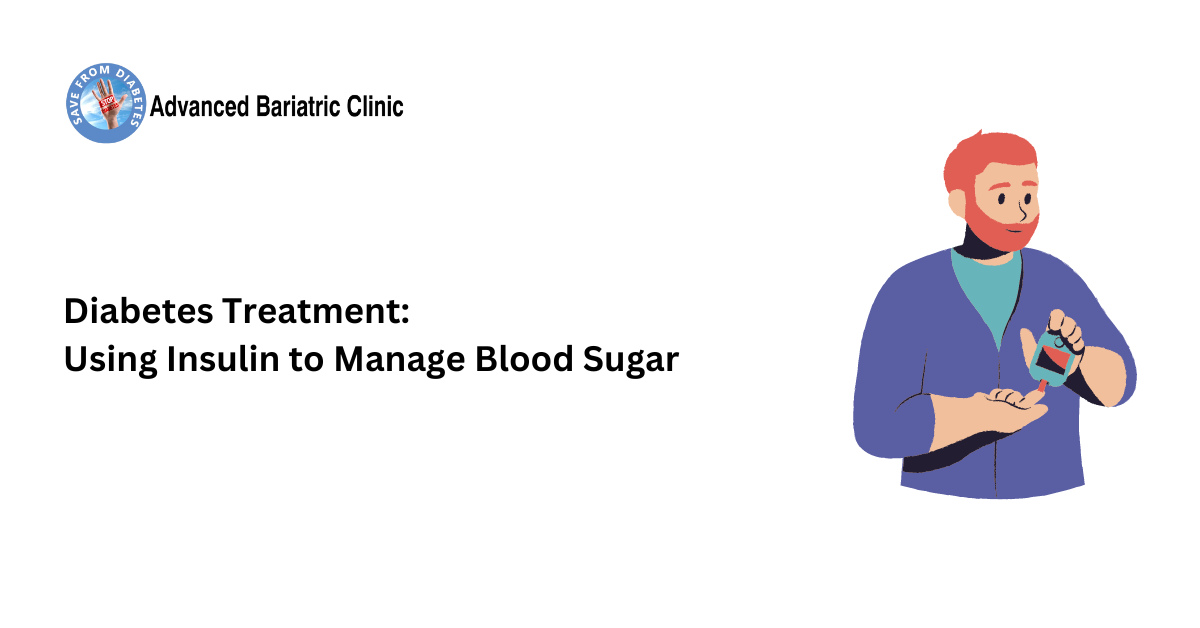Diabetes Treatment: Using Insulin to Manage Blood Sugar

- advancedb_admin
- July 22, 2023
- 4:59 am
- No Comments
Diabetes is a chronic condition that affects how your body turns food into energy. There are two main types of diabetes: type 1 and type 2.
- Type 1 diabetes is an autoimmune disease. This means that your body’s immune system attacks and destroys the cells in your pancreas that produce insulin. Insulin is a hormone that helps your body use glucose for energy. Without insulin, glucose builds up in your blood.
- Type 2 diabetes is the most common type of diabetes. It occurs when your body becomes resistant to insulin or doesn’t make enough insulin.
Read More : What Is Type 2 Diabetes?
If you have diabetes, it’s important to manage your blood sugar levels to prevent complications. One way to do this is to use insulin.
What is insulin?
Insulin is a hormone that helps your body use glucose for energy. It does this by allowing glucose to enter your cells. When you have diabetes, your body doesn’t produce enough insulin or doesn’t use insulin effectively. This can cause glucose to build up in your blood.
How does insulin therapy work?
Insulin therapy is used to replace the insulin that your body doesn’t produce or doesn’t use effectively. Insulin therapy can be given through injections or an insulin pump.
There are many different types of insulin available. Your doctor will work with you to choose the type of insulin that’s right for you.
What are the goals of insulin therapy?
The goals of insulin therapy are to:
- Keep your blood sugar levels within your target range.
- Prevent or delay diabetes complications.
- Improve your quality of life.
What are the side effects of insulin therapy?
Insulin therapy can cause a few side effects, such as:
- Low blood sugar (hypoglycemia)
- Weight gain
- Allergic reactions
- Skin irritation at the injection site
If you experience any of these side effects, talk to your doctor.
How do I manage insulin therapy?
If you’re taking insulin, it’s important to work closely with your doctor to develop a diabetes management plan. This plan will include:
- Monitoring your blood sugar levels regularly
- Eating a healthy diet
- Getting regular exercise
- Taking your insulin as prescribed
It’s also important to know the signs and symptoms of low blood sugar and how to treat them.
Conclusion
Insulin therapy is an important part of managing diabetes. If you have diabetes, talk to your doctor about whether insulin therapy is right for you.
Here are some additional tips for managing diabetes with insulin:
- Check your blood sugar levels regularly, especially before and after meals and snacks.
- Eat regular meals and snacks throughout the day.
- Exercise regularly.
- Take your insulin as prescribed by your doctor.
- Know the signs and symptoms of low blood sugar and how to treat it.
- Be prepared for any unexpected events, such as travel or illness.
Insulin remains a crucial and effective treatment for managing blood sugar levels in diabetes. At Advanced Bariatric Clinic, we prioritize personalized care to enhance patients’ overall well-being.
With careful management, people with diabetes can live long and healthy lives.
Recent Posts
-
 Caring for Young Warriors: Managing Diabetes in Children and Adolescents in Hyderabad
Caring for Young Warriors: Managing Diabetes in Children and Adolescents in Hyderabad -
 Demystifying Diabetes in Hyderabad: Prevalence, Causes, and Preventive Measures
Demystifying Diabetes in Hyderabad: Prevalence, Causes, and Preventive Measures -
 Balancing Tradition and Health: Traditional Hyderabadi Foods for Diabetes Managemen
Balancing Tradition and Health: Traditional Hyderabadi Foods for Diabetes Managemen -
 Navigating Diabetes in Hyderabad's Climate: Tips for Effective Management
Navigating Diabetes in Hyderabad's Climate: Tips for Effective Management -
 Why Advanced Bariatric Clinic is the Best Diabetologist in Hyderabad
Why Advanced Bariatric Clinic is the Best Diabetologist in Hyderabad



